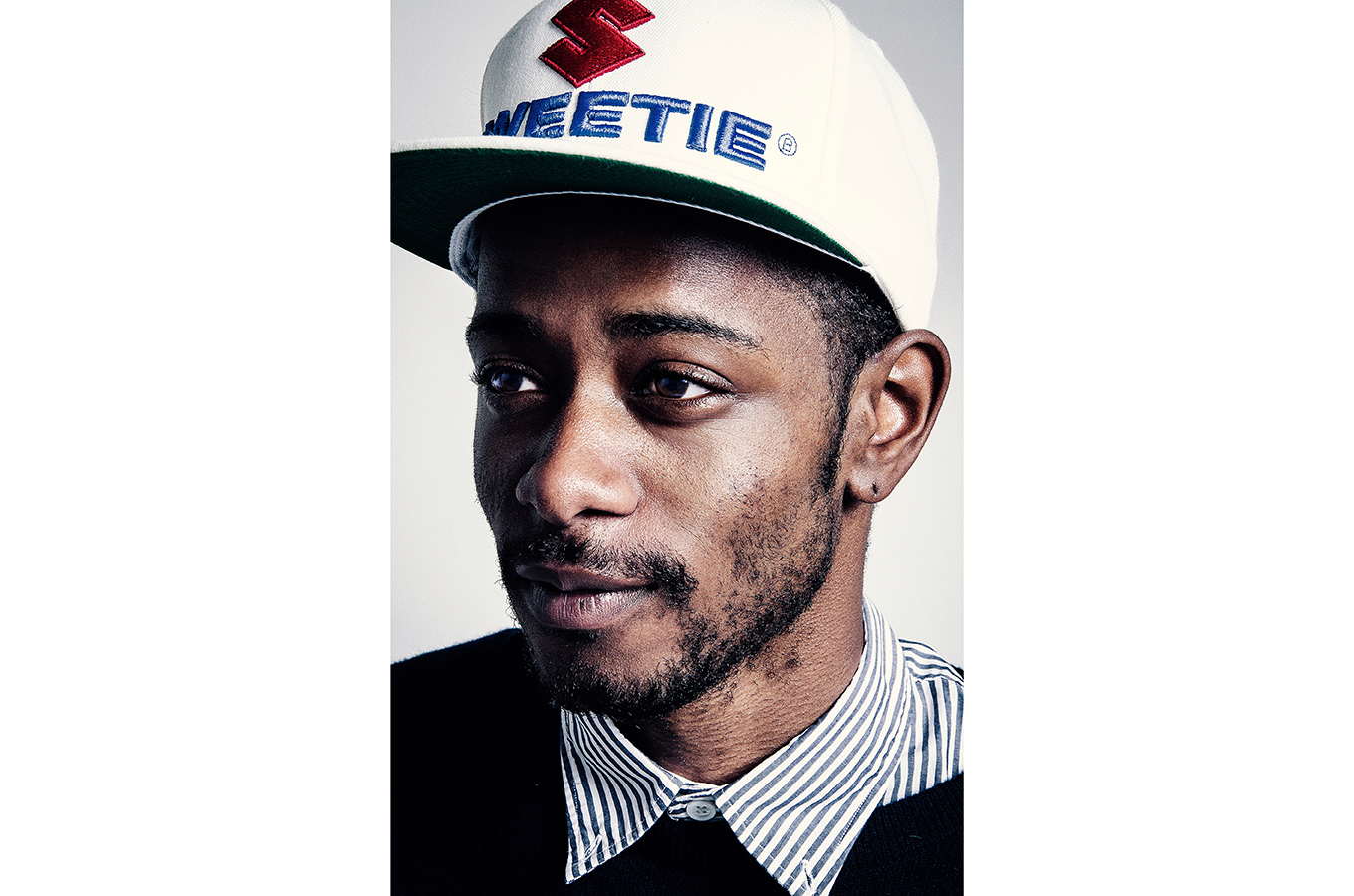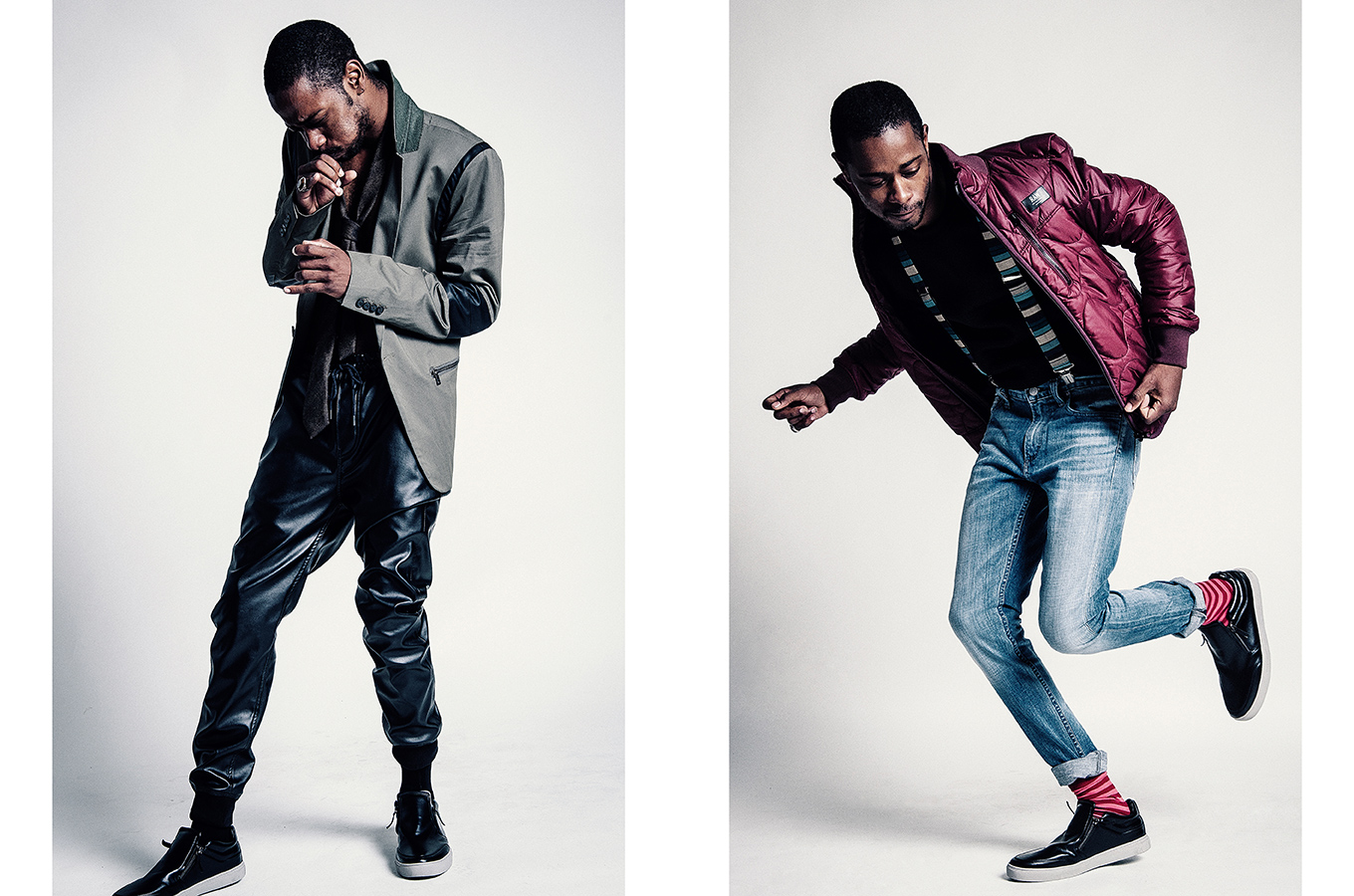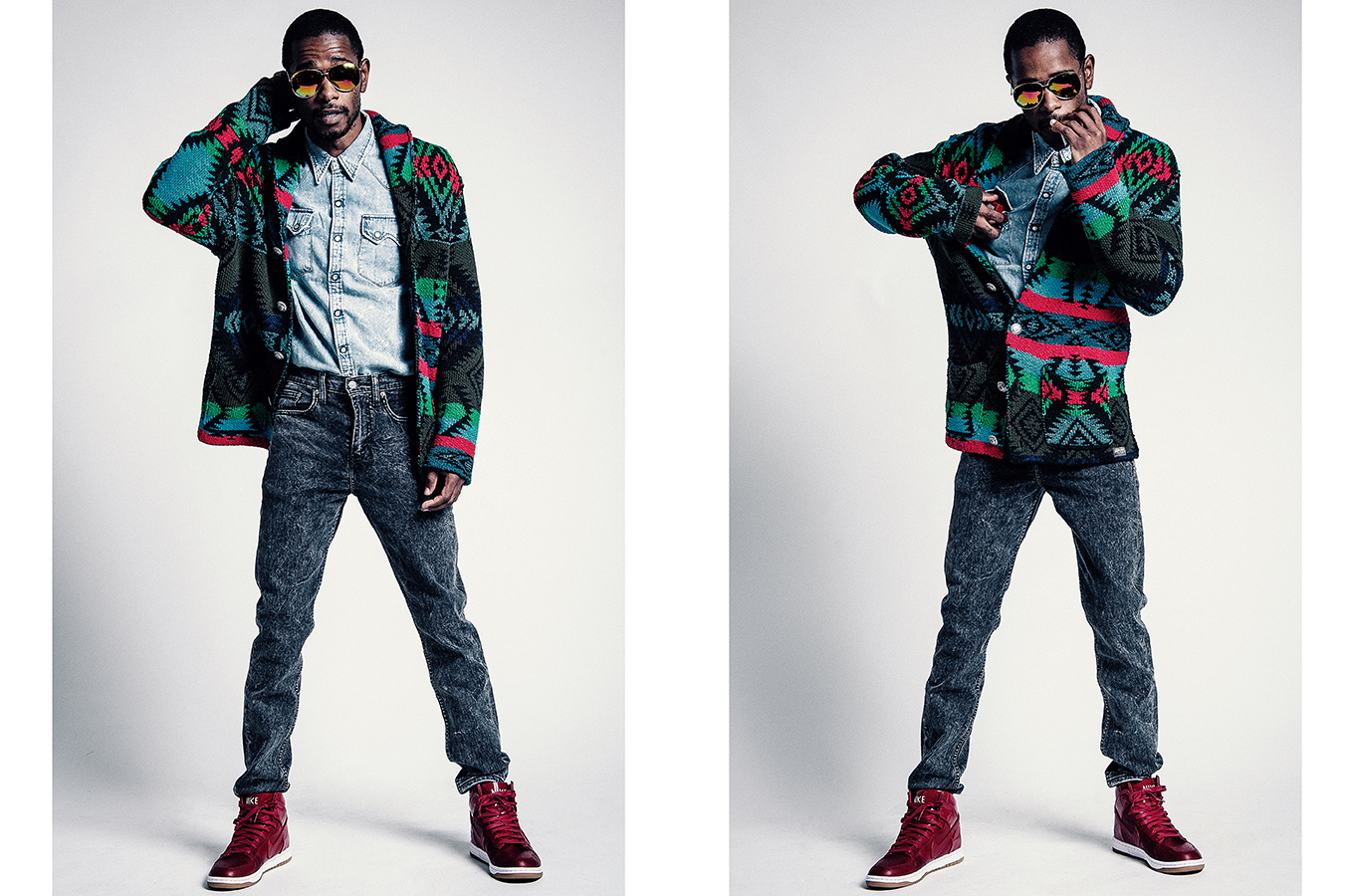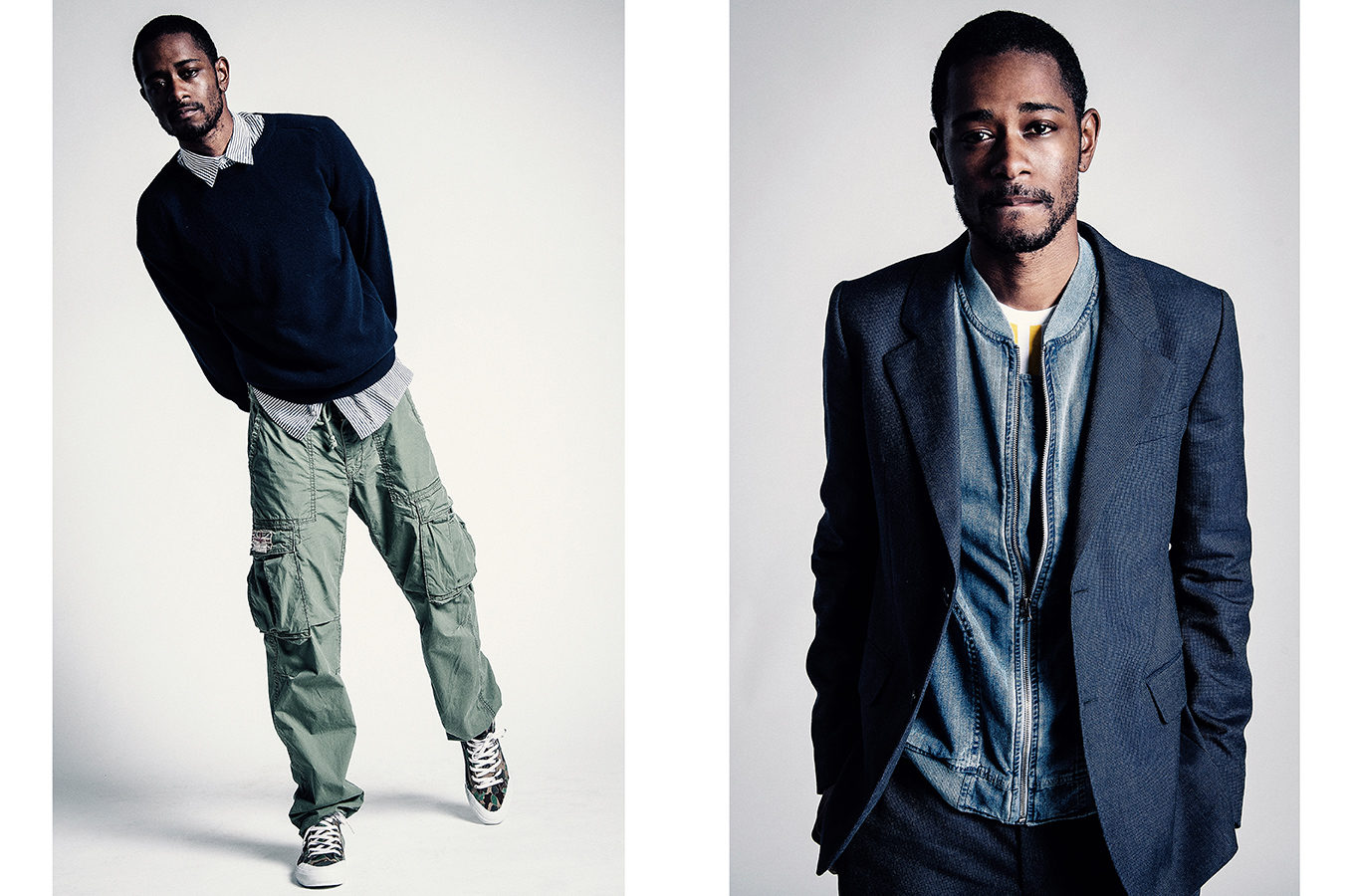Lakeith Lee Stanfield
Interview by Destin Daniel Cretton, Editor Nicole Disson
Images by Jan-Willem Dikkers
Styling by Naomi deLuce-Wilding
Video by David Markun
“My art was me trying to account for all these crazy
things in the world. A lack of satisfying
answers has always been my driving force.”
— Lakeith Lee Stanfield
LaKeith Lee “Keith” Stanfield
Lakeith Stanfield is a burgeoning actor and rapper known for his role in both the short and feature film versions of Short Term 12. Stanfield has also appeared in Selma and Dope and stars as Snoop Dogg in this summer’s N.W.A. biopic, Straight Outta Compton. He will appear in Don Cheadle’s upcoming Miles Davis biopic, Miles Ahead, as well as the Oliver Stone film, Snowden, alongside Joseph Gordon-Levitt and Shailene Woodley. Stanfield and producer HH have released one eponymous debut EP under their indie rap project MOORS.
Destin Daniel Cretton
Hawaiian screenwriter, director and producer Destin Daniel Cretton is known for his successful 2008 short Short Term 12 which won the Short Filmmaking Award at Sundance 2009. In 2013, Cretton adapted Short Term 12 into a critically acclaimed feature-length film of the same name.
Short Term 12
An extended version of the eponymous short, Short Term 12 is a feature film written and directed by Destin Daniel Cretton based on the auteur’s work experience in a group home for troubled teenagers. The recipient of extensive critical acclaim, the film premiered at the 2013 South By Southwest festival and won the Grand Jury Prize for best narrative feature.
Keith Stanfield and I first worked together about seven years ago when he acted in my thesis film for grad school. As a 16 year old with no acting experience, he was one of the most authentic performers I’d ever met. Since then, I’m happy to say that my admiration for him has only grown, both as an artist and a human. Watching his personal and professional success over the past few years has been such a joy, and it couldn’t be happening to a better soul. He’s an observer of humans, a fearless and vulnerable poet, a deep thinker, and a dude who knows how to be silly and have a good time. I never pass up an opportunity to hang with Keith, especially if wonton soup is involved.

Destin Daniel Cretton: I’ve never done an interview before. I wrote down some questions on these crappy sheets of paper… Maybe before we start, can you describe the setting we’re in for people who are reading this?
Lakeith Lee Stanfield: We’re in this restaurant in Chinatown, New Dragon Seafood. There are these nice ornaments hanging up around. It’s nice and comfy. And I get my all-time favorite food, wonton soup. That really sold me on coming to this place ’cause I don’t care where I’m at, what I’m doing—I can always have wonton soup.
DDC: Where does that come from?
LLS: I dunno, I just love it man. I find these meals that I really like since I’ve been out here in LA, like wonton soup. Kale salad is another one. I forget what that fish is called, but there’s some majestic fish that I really like too.
DDC: Part interview and part food critique. I just googled “best wonton soup in LA,” and this was one of the places that came up. So we’ll see. Where are you from?
LLS: I come from San Bernardino; I was born there in 1991. Then I moved to Riverside. It was me, my mom and my two brothers, and we lived with my auntie for a couple of years. My mom met a dude out there and had two more kids. My auntie was really old fashioned, so we were all running around in overalls and prayed and had Sunday dinner. We were raised by all women—no real dudes in the house—so the women had to play both sides and were strict. We had a really structured life. Then when I was about six or seven, we moved back to San Bernardino, and all that structure kinda fell away. I don’t know about the rest of my brothers, but I was on my own. It was a pretty bad environment and ghetto, but for me it didn’t feel bad because it was what I knew. I was like, “I guess I gotta roll with it.” But looking back, it was definitely not the optimal situation for a young kid. I just remember getting into fights everyday and hearing gunshots in the neighborhood. And we were poor and didn’t have much food, so we would be scavenging and running about, playing in the trash cans. When I was 14, we moved to Victorville.
“I do know that drawing on the things in my past
that have been sort of scary and crazy
and hard for me… I try and bring that level
of seriousness to my roles.”
— Lakeith Lee Stanfield
DDC: Did you lose friends with that move or anything?
LLS: I would say I lost knuckleheads, man. We were all young and dumb and not good for each other, so I was definitely hanging around with crowds that I felt I had to be cool around. I had to live up to their idea of what was cool, so I tried to do that, but in the back of my mind, I always thought, “This is so stupid. Why the hell am I doing this?” Going to Victorville really gave me the platform to reassess all that shit and start new. I was still dumb and doing dumb stuff, but I didn’t get into as much trouble. I always wanted to act. Ever since I can remember, I just wanted to perform.
DDC: What was your first artistic expression that you can remember?
LLS: The first that comes to mind—this is why I respect my auntie, who gave me a lot of confidence early on—she would allow us decorate socks and to do these little puppet shows on the side of her bed. She would invite other family members and her friends to watch us do these them, and looking back I know they couldn’t have possibly cared, but the support that they gave meant so much. I remember looking up and they would all be clapping, and I felt good about being able to be free and expressing.
DDC: As a kid, what did creativity do for you in dealing with the world around you?
LLS: I wanted to know everything, and I think not understanding and the mess of trying to understand became my little creativity. My art was me trying to qualify all these crazy things in the world. I grew up really hardcore Protestant Christian, so there were a lot of rules and a lot of different tenets and traditions and I always thought, “Well why? Why do we have to have Sunday dinner? Why are we praying? Who are we praying to?” A lack of satisfying answers has always been my driving force in creativity. I’m not satisfied with general answers. I’m always looking to dig a little bit deeper.
DDC: How does the place you came from influence what you currently do creatively?
LLS: This crazy thing goes around where people are like, if you’ve gone through something kind of traumatic or messed up, that it informs you as an artist, and it makes your artistry that much greater. I don’t necessarily agree with that sentiment. But I do know that drawing on the things in my past that have been scary and crazy and hard—the level of seriousness when your mom is in a fight with your dad, and you’re standing there watching it, and everything is happening in real time so quickly—I try and bring that level of seriousness to my roles. That feeling of urgency. And all of the great times spent with family and the really cool beautiful things that happened in my younger life, those things help me remember to just be immersed in something and really enjoy it and enjoy yourself.
DDC: One of the things I really, really loved about you and working with you as an artist is your positivity. Did that come from your family or a role model or was it a combination of things?
LLS: It was really a combination of things. One of the key times in my life was when I was maybe about 17 to 19. It was really crazy—I got 666 tattooed on me and the Eye of Ra and 13. I started really searching for some type of spiritual guidance, and relinquished the belief in religion for a whole bunch of years. I got into Eastern thought and spirituality and chakras and being balanced and at peace. I felt it to be true. There’s bad, there’s good, and then there’s real. It goes all the way down even to black and white and these silly bigotries we hold over each other—it all emanates from yourself, so just take responsibility and try to pick up the blocks and change things. A lot of that has to do with studying ancient Egyptian tenets and Buddhism and Taoism, and I was really into Hindu thought for a long time. There are a lot of universal truths in that and in Christian religion as well.
The Purge
A 2013 sci-fi horror film written and directed by James DeMonaco.
Selma
Directed by Ava DuVernay, Selma is a 2014 drama about Martin Luther King, Jr. and his non-violent campaign during the 1965 voting marches from Selma to Montgomery, Alabama, starring David Oyelowo as Dr. King. The film met with critical success, and was nominated for the Academy Award for Best Picture as well as a Golden Globe.
DOPE
Written and Directed by Rick Famuyiwa (The Wood, Talk To Me), Dope premiered at Sundance 2015, garnering the Dramatic Editing Award and a nomination for Grand Jury Prize. The film stars Shameik Moore as a high-school senior who becomes entangled with a dangerous drug dealer. The film also features rapper A$AP Rocky, Zoe Kravitz, Tony Revolori (Grand Budapest Hotel) and Kiersey Clemons..
Miles Ahead
A forthcoming biopic about legendary jazz musician Miles Davis starring and directed by Don Cheadle.
Don Cheadle
Don Cheadle is an American actor who has appeared in numerous films including Crash, Hotel Rwanda, Ocean’s Eleven and the Iron Man series. He has roles in the upcoming films Miles Ahead (which he also directed) and Captain America: Civil War, and stars in the Showtime series House of Lies.
Straight Outta Compton
Directed by F. Gary Gray (Friday, The Italian Job) and produced by Ice Cube and Dr. Dre, Straight Outta Compton chronicles the rise and fall of the famous hip hop and gangsta rap group N.W.A. The film stars Jason Mitchell, Corey Hawkins, O’Shea Jackson, Jr., Aldis Hodge and Neil Brown Jr.
DDC: So we did Short Term 12. We did the short in 2008, and since the feature Short Term 12 in 2013, quite a lot has happened in your career. I actually wrote down some of the things that have happened in your career on this card. The Purge. I didn’t see it because I don’t watch horror movies, but I heard it’s scary.
LLS: Yeah, it was a really small part. I was just a creepy dude in a mask, and I like pull up the mask and scare.
DDC: Oprah happened—Selma.
LLS: I remember I introduced my brother to Oprah—she was throwing an after-party in celebration for the film. He had been going through some stuff, and I brought him down to meet her. I had never seen until that time—and I have never seen since—his face light up like that. I was like, “Oprah, this is my brother.” And she was like, “Hey, honey!” She gives him a hug and he’s just like, “Ohmygod.” I was so, so happy to see that. And I thanked her for that because she doesn’t know how much it meant. It gives you hope to meet Oprah. Anyone who hugs Oprah just feels that energy of, like, rejuvenating spirit. She’s a really, really good person.
“I think everyone involved in that film might be
on a terrorist list because we filmed
right next to the house that Snowden lived in.”
— Lakeith Lee Stanfield
DDC: So cool. Um… Dope.
LLS: Dope was wild, man. I played a Blood, and I had to really tap into the gangster side or whatever and revamp what I saw growing up—those dudes out there, like, “Ay, Blood!” Went back into that, tapped into that. We had to pick on a kid who was a black nerd, and I thought it was such a cool story. No one talks about that: what it means to be black and have an education or talk a certain way or think a certain way. It’s like everyone wants to put you into a box, including people who are African American. Like, “You gotta be this to be black, you gotta have tattoos, you gotta be a rapper,” and trying to our define culture, which has been a difficult thing for us. So we try to install all these fake cultures—you know, use music and hip hop as a guide—which is pretty much bullshit. I’m glad that something touched on that and really understood that. It’s a multiplicity thing. These are the things that we all know—well, most of us know—and we try to ignore but don’t really. When you meet people, you automatically come up with assumptions about them. That’s natural, that’s a human thing. But those assumptions, I think, could be rooted more in reality. We could open it up a little bit, and I think movies like Dope serve that kind of purpose, making you second guess what you thought at face value.
DDC: Miles Ahead.
LLS: I don’t know when this movie’s gonna come out. I hope it does, and I’m saying this on record ’cause I want them to understand that we need to get this movie out. Nah, but it’s been in post[-production] for a minute. It’s a really cool one—a musical. When music and film come together, I just fucking love it.
DDC: What’d you have to do for this?
LLS: I had to learn how to play the trumpet—“play the trumpet,” you know. So I spent a whole bunch of time in my hotel room trying to get it all down and it was really, really beautiful to feel married to that instrument… in the movie, it was my release. Working with Don Cheadle was great, of course. He’s brilliant.
DDC: What was it like meeting Dr. Dre on the set of Straight Outta Compton?
LLS: Oh, that was crazy. I expected him to be a little bit meaner. I thought he was gonna be like, “Hey man, wassup,” but he was just like, “Hey man.” Really nice dude. I guess I was sorta downloaded with the gangster rap persona, and I thought he was gonna be cold, but he was very open, very nice, very welcoming. We sat down and watched some scenes the first day I got there, and he and was telling me that he was very happy for me to be a part of it.
DDC: It just sounds a little strange ’cause you’re playing someone he’s really close to.
LLS: Oh, Snoop D-O-Double-G. Yeah, Snoop Dogg. This part where Dre comes in, he’s basically watching me be Snoop, and his exact words were, “Man, that shit is money.” I was like, “Oh, okay. If he’s telling me it’s money, it must be money.” I kinda got his stamp of approval, and if anyone thinks it’s not good, Dre said it was good so…
Oliver Stone
American-born auteur Oliver Stone is known for his feature films, including Platoon, Wall Street, Natural Born Killers and his latest film Snowden, releasing later this year.
Snowden
Edward Snowden is a computer programmer, former CIA employee and former NSA subcontractor who is known for exposing the vast extent of the NSA’s covert surveillance capabilities. He fled to Russia in 2013 to avoid capture by the U.S. government. The film Snowden, directed by Oliver Stone and starring Joseph Gordon-Levitt, chronicles the controversial events surrounding Snowden’s political actions.
DDC: And then recently you got to work with Oliver Stone [on Snowden].
LLS: Yeah, crazy! He’s just so fast. He thinks at a million miles per hour and he’s a genius. It’s a very interesting thing working with him—you feel like you become accelerated to keep up. Doing that film, we got access to so much crazy information about surveillance. We learned a lot about the deep web, and I’m probably on a terrorist list. I think everyone involved in that film might be on a terrorist list because we filmed right next to the house that Snowden lived in.
DDC: That’s good company to be with on the terrorist list, though.
LLS: We had this crazy consultant who worked for the inner-city for a number of years who just taught us a lot about the deep web, man. Oliver is another guy who can seem intimidating, but really cool, smart, funny dude, and he’s young at heart too. I’ll be dancing and get down and stuff. I look up, and he’s dancing. It’s just refreshing to see.
“There’s bad, there’s good, and then there’s real…
it all emanates from yourself,
so just take responsibility and try
to pick up the blocks and change things.”
— Lakeith Lee Stanfield
DDC: What’s a moment where you found yourself saying, “Holy shit, how am I here right now?”
LLS: Damn, I gotta say the BET awards. For a long time, I thought BET represented negative stereotypes and perpetuated all of this stuff that I found to be lamentable. As I’ve grown, I have come to understand that while there are negative stereotypes out there and some of these companies curate that stuff, it isn’t so black and white. That said, it’s very weird to be sitting in the second row at the BET awards around all these celebrities. Celebrities are weird. Being around them is very weird.
DDC: What is truly important to you?
LLS: Freedom… enjoying life… high times… unity. I know all this sounds so PC, but that’s really what’s important—unity—us sharing this big, crazy earth together and going through crazy things. Down times and high times. Living life to the fullest and loving each other. Being good to each other.
DDC: You can interpret this next question however you want… What do you want?
LLS: The crazy thing is, I think I already have it. I’m not sure it gets too much better. I feel good. I’m enjoying life. I’m doing what I’ve always wanted to do. And I’m at peace. I don’t have no hate going for nobody. I’m not running from anybody. I guess there’s more to be determined, but right now I have everything that I need.
DDC: I don’t really like when people ask where you see yourself in ten years because it’s just so far away. So let’s say three years. Three years from now, who do you hope to see in the mirror?
LLS: Well, I hope I have dreads and a big beard. I’ve always wanted that. Man, I just hope I continue to grow and be an ever-learning, constantly changing individual. I hope even within three years time I start building something that can help other people. I hope at some point to start a movie theater that’s like, “This is what I want to show.” I just hope I’m new and improved and wiser—more centered, more balanced, more calm. I want to see a lot more; I want to travel. I want to see how different people live—that’s so informative.




Behind the scenes





